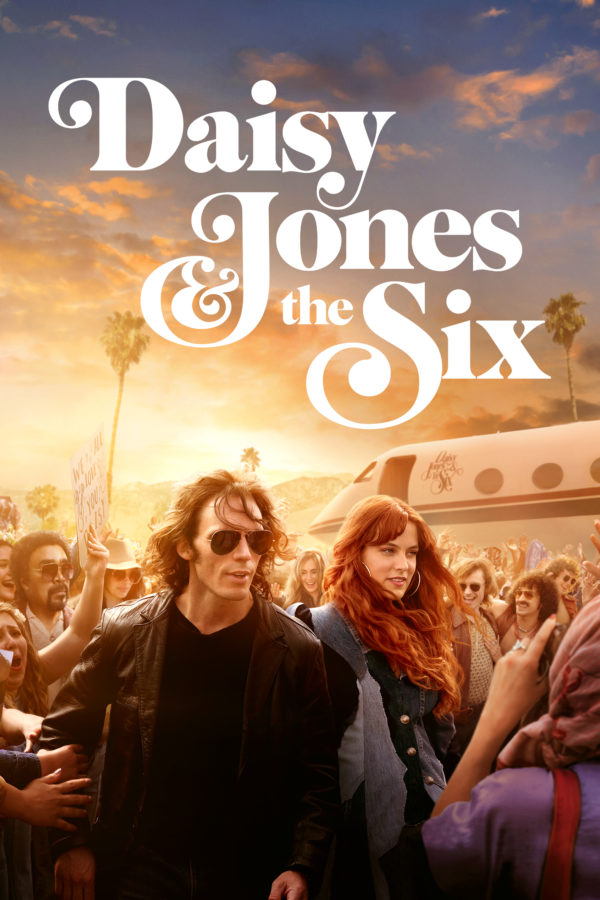“Daisy Jones & the Six” falls short of its source material
This photo is courtesy of Daisy Jones & the Six
March 15, 2023
In 2019, Taylor Jenkins Reid released her best-selling novel “Daisy Jones & the Six” to critical acclaim. “Daisy Jones & the Six” follows a fictional famous 70s rock ’n’ roll band as they are interviewed about their journey to stardom and why they eventually break up. The popularity of the book led to a deal with Amazon Prime to turn it into a 10 episode series, with the first episode releasing on Friday, March 3. The adaptation was produced by Reid, which gave fans hope that it will stay loyal to the original material. Nevertheless, the show still manages to fail as an adaptation.
In terms of casting, the show features a solid ensemble: No breakout stars, but solid performances all around. Camila Morrone gives an excellent performance as Camila Dunne, as does Suki Waterhouse as Karen Siko. Riley Keough, playing the titular Daisy Jones, does a particularly great job—she manages to portray Daisy’s headstrong personality while still giving her the southern charm that Daisy possesses in the book. In contrast, her co-star Sam Claflin, playing rockstar and the band’s frontman Billy Dunne, gives a mediocre performance. While all of the other actors are fit for their roles, Claflin feels out of place as Billy; his performance is angular and weirdly heroic for a character that’s supposed to be self-aware and morally gray. Sure, Claflin feels fit for a rockstar, but he doesn’t feel fit for Billy Dunne.
The show starts off by mirroring the book, keeping the interview format. A faithful start, certainly, but also a questionable one—in the book, the documentary style allowed room for unreliable narration and loose strings. Characters could have different accounts of the same night, refuse to answer questions, and purposefully “forget” events that may reflect poorly on them. However, it’s not as simple in a show. A true documentary format would be disappointing—instead of seeing any actual acting, you’d only get characters explaining the events. So instead, the show opts for a mix: one or two characters will say a couple lines in an interview scene before it cuts to the event in question. Unfortunately, this means you get the worst of both worlds. There’s no uncertainty; the only conflict in timelines is told in the oral interviews, but they still reveal what actually happened. Because the interview scenes are few and far between, they just feel like a waste of time.
In the novel, a recurring theme was the band members constantly feeling disregarded in favor of Billy Dunne. Ironically, in the adaptation, this is exactly what happens: we practically never see the rest of the band casually unless it relates to Billy or Daisy. The decision to cut bassist Eddie Roundtree’s brother, Pete Loving, is for good reason, considering his inclusion would result in five characters lacking development rather than four. The show focuses on Billy, Daisy, and Camila’s love triangle and neglects all other characters. It truly does the show disservice—there are so many other compelling aspects of the ensemble that we never see in the show because we’re too busy talking about Billy and Daisy’s will-they-won’t-they.
A perfect example of this is the change to Eddie’s character in the show. The original material has Eddie as a newer addition to the band who feels that Billy is too self-centered and that the band is a dictatorship when it ought to consider the feelings of other members as well. However, the show makes Eddie an original band member. They take away his reasonable motivations for disliking Billy and instead replace them with an under-developed crush on Camila, Billy’s wife. It’s clearly an attempt to ensure Billy’s portrayal as a golden boy, the perfect heartthrob rockstar. By giving Eddie separate reasons to rail against Billy, it dismisses his fairly legitimate concerns that Billy doesn’t think of anyone but himself.
Even Daisy is missing key parts of her character because of all the love triangle discourse. Arguably Daisy’s biggest recurring thread is her addiction. The book heavily features her drug and alcohol problem, and it’s a perfect contrast to Billy’s journey with sobriety, but it’s also almost completely missing in the show. What was originally a nuanced portrayal of addiction and how it can erode one’s character was turned into a one-scene mention. The show does have a chance to recover—there are, after all, more episodes coming, but early reviews say the adaptation only toes the line, never actually getting into the gritty scenes.
One of the biggest charm factors from the book is its songs; a lot of fiction centers musicians, but not a lot of those books are willing to show the reader the musician’s works. “Daisy Jones & The Six” puts the lyrics of every song at the back of the book, and throughout the chapters lyrics are picked apart and discussed. The book uses music as a way to develop the story and flesh out plot points and characters, whereas the show uses original music as a backdrop of montages. The contrast is stark, and while watching the show, you can feel it grasping for things to fill the void that the songs leave. They discuss the music or its lyrics only once in episode three; even then, the show doesn’t give you the specific lyrics, instead discussing the vague. While this is certainly an improvement, without any insight into what characters are talking about, it remains a meaningless conversation.
In place of the music actually being featured in the show, the adaptation provides the album itself, available to stream and buy. Unfortunately, in relation to the show, the new album falls completely flat. The aforementioned back-of-book lyrics are scrapped, instead featuring a new eleven song tracklist and rewriting the only two songs that remain. Sadly, these rewrites fail in their original purpose as a literary device. While book lyrics had the ability to subtly tell you what characters wouldn’t say out loud, the new lyrics beat you over the head with their meaning. Lyrics like “Please, I’m down on my knees/I have a family/Please, I’m the worst at this/I need you to say no” are obvious depictions of Billy’s attempts to stay faithful to Camila: there’s none of the subtle allusions the book utilized so well.
Overall, the show isn’t bad, but it falls short as an adaptation. The aspects of the original that make it so charming and compelling are gone from the show, and though some features are executed well, it’s not the perfect book-in-show-form you’d hope for, nor do its additions give anything substantial to the story. “Daisy Jones & the Six” has seven more episodes, and we can only hope it’s uphill from here.



Mark • Apr 13, 2023 at 5:55 am
I hope you changed your mind… I loved the show. Thought they did about as good of a job as you could with the story